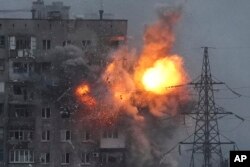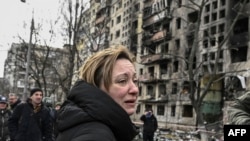Ukrainian officials say Russian troops fired artillery on suburbs of the capital, Kyiv, Monday, as Russian and Ukrainian delegations held a fourth round of talks without signs of a breakthrough.
The talks, which are taking place by video link rather than in neighboring Belarus as in the past, paused for the day, but are set to resume Tuesday.
Ukrainian negotiator Mykhailo Podolyak tweeted after the talks, "Communication is being held yet it's hard." He had raised hope of progress on Sunday by saying that Russia had been "listening carefully to our proposals" and was beginning to talk "constructively."
Officials in Kyiv say at least one person was killed when a shell hit a nine-story residential building in a northern district of the city early Monday. They say Russian forces also struck an airplane factory in the capital, sparking a large fire.
The violence comes a day after Russia launched a lethal cruise missile attack on a western Ukraine military base just 25 kilometers from NATO-member Poland. At least 35 people were killed and 134 wounded in the attack on the International Center for Peacekeeping and Security.
A senior U.S. defense official said Monday that "almost all of Russia's advances remain stalled" inside Ukraine. That includes Russian advance forces outside of Kyiv, which are about 15 kilometers from the city center, and a convoy of Russian troops around the city, according to the latest U.S. assessment.
In a rare positive development Monday, Ukrainian officials in the southern city of Mariupol said a convoy of civilian cars was able to leave the besieged city through a humanitarian corridor after many previous attempts to evacuate civilians collapsed. Officials said 160 cars left in the first two hours the corridor was open.
Ukrainian officials say as many as 2,500 civilians have died in the Mariupol since Russia began its attacks on the southern port city. The figure could not be independently confirmed.
Fox News reported one of its journalists, Benjamin Hall, was seriously injured Monday while reporting outside of Kyiv. The development comes one day after an American journalist was killed while reporting on the war. Brent Renaud, an award-winning filmmaker and reporter, died in Irpin, a suburb of Kyiv, according to officials.
Washington has dismissed Kyiv's appeals for a no-fly zone over the country and rejected a Polish proposal to send their Russian-made jets to a U.S. airbase in Germany to be sent to Ukraine. On Saturday, President Joe Biden authorized up to $200 million worth of American assistance in the form of military education and training for the Ukrainian army, following a previous security assistance package worth $350 million.
"Almost all" of the initial $350 million package has been delivered to Ukraine, according to Pentagon press secretary John Kirby. He said work is starting on the next $200 million package and that the United States is working "as fast as we can and as nimbly as we can."
Four U.S. senators visited Poland over the weekend to speak to Ukrainian refugees. Democratic Senator Amy Klobuchar said Congress is looking at more ways to boost Ukraine's defenses.
"We're not going to give (Russian President) Vladimir Putin a road map of how that can be done," she told VOA in Warsaw. "There are many ways — whether it is more drones, whether it is other weapons — that we can help, and clearly we are all committed to doing that. We must do more."
Members of the delegation also told VOA they were concerned about the humanitarian crisis the invasion has unleashed.
"It's heartbreaking to see what's happening," said Republican Senator Rob Portman, who is retiring this year. "We had a chance to visit with refugees coming over the border and heard their stories of bombings and their homes being destroyed, families split up."
Republican Senator Roger Wicker of Mississippi told VOA he was "angry" over Russia's demands to hold on to its gains.
"I really reject any of this talk about a settlement whereby Ukraine would retain part of their territory and Russia would get to keep some of the conquered area," he said.
U.N. Secretary-General Antonio Guterres said the decision by NATO countries not to initiate a no-fly zone over Ukraine is based on an "analysis that I think we need to be prudent, even if I understand the dramatic appeal of the Ukrainian government."
In Russia, an anti-war protester interrupted state TV’s Channel One evening news broadcast in Moscow, holding a poster that said "No War" in English, and underneath those words, “Stop the war. Don’t believe the propaganda. Here they are lying to you,” in Russian.
The poster was signed in English, "Russians against the war."
Talks with China
In another development Monday, U.S. national security adviser Jake Sullivan and officials from the National Security Council and the State Department met in Rome with China's top diplomat Yang Jiechi.
The talks included a "substantial discussion of Russia's war against Ukraine," according to the White House, and "also underscored the importance of maintaining open lines of communication between the United States and China."
Media reports emerged Sunday that Moscow has requested military and economic assistance from China for Russia's war in Ukraine. Earlier, the White House warned China of severe "consequences" if it helps Russia avoid sanctions.
State Department spokesman Ned Price told reporters Monday that the United States is watching very closely the extent to which China or any other country provides any form of support to Russia.
"We have communicated very clearly to Beijing that we won't stand by, we will not allow any country to compensate Russia for its losses," he said.
Chinese arms sales to Russia would have "a devastating impact on the U.S.- China relationship, because it would clearly align the Chinese with the Russians, against the United States, Europe in a war," Robert Ross, a political science professor of at Boston College, told VOA.
China is in a unique position because of its partnership agreement with Russia, according to Stephen Roach, a senior fellow at Yale University's Jackson Institute of Global Affairs. He told VOA that China has "considerably greater" leverage over Russia than even Western countries that have implemented "unprecedented sanctions" on Russia.
"China has something that the West does not have, and that is the partnership" with Russia, he said.
Sullivan on Sunday responded to growing concerns that Russia would use chemical weapons in Ukraine.
"We can't predict a time and place," he said on CBS, noting an escalation of rhetoric from Moscow falsely accusing the United States and Ukraine of developing chemical or biological weapons to use against Russian troops.
Ukraine's human rights ombudswoman said the Russians used a phosphorus munition in an overnight attack on the eastern Ukrainian city of Popasna in the Luhansk region.
VOA was not immediately able to verify the claim. While phosphorus is not considered a chemical weapon, its use against human beings is banned under international law.
Eastern European chief Myroslava Gongadze, White House correspondent Anita Powell, Senior diplomatic correspondent Cindy Saine, National security correspondent Jeff Seldin, U.N. correspondent Margaret Besheer, State Department Bureau Chief Nike Ching, and Mandarin Service reporters Lin Yang and Si Yang contributed to this report.
Some information also came from The Associated Press, Agence France-Presse and Reuters.











